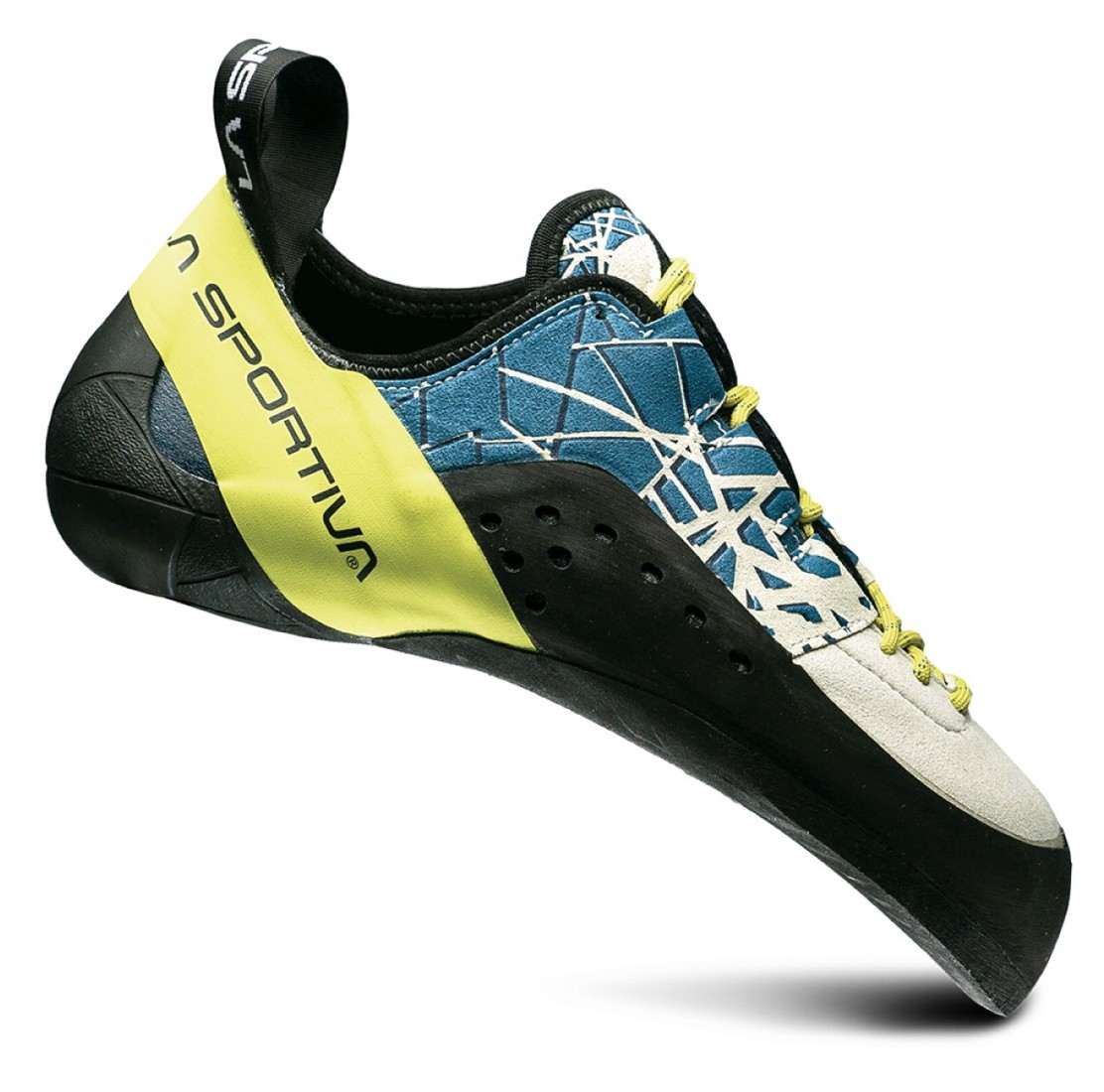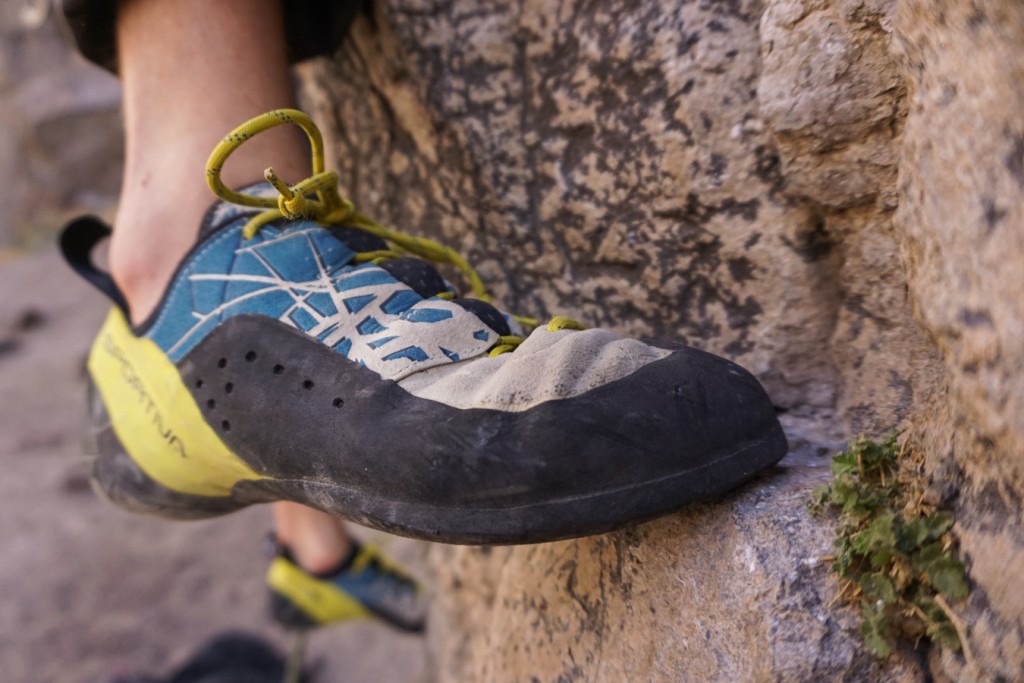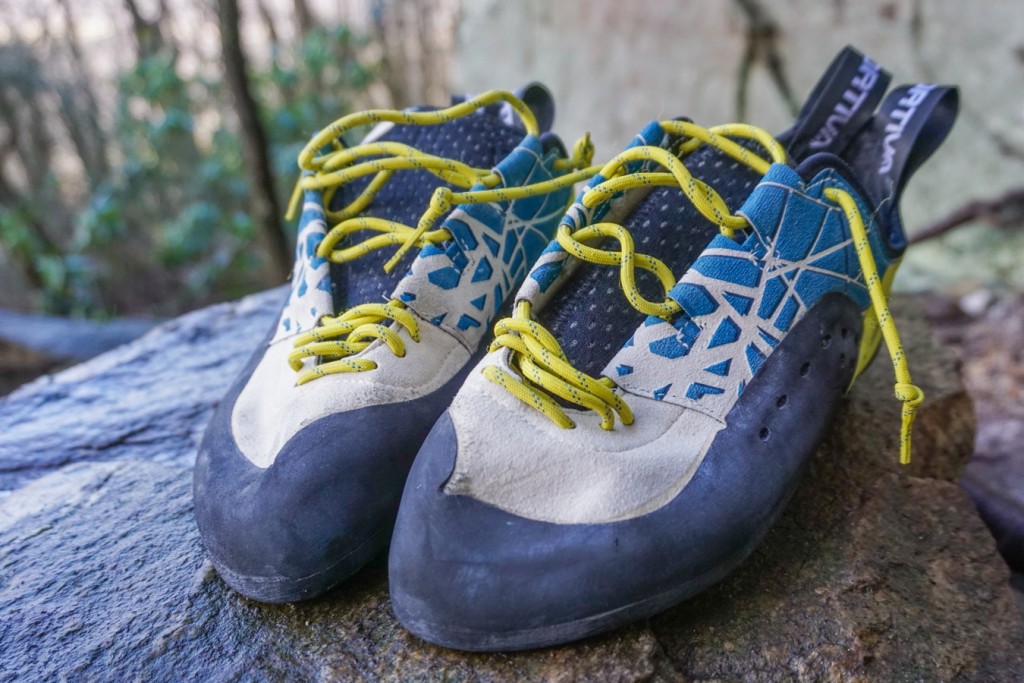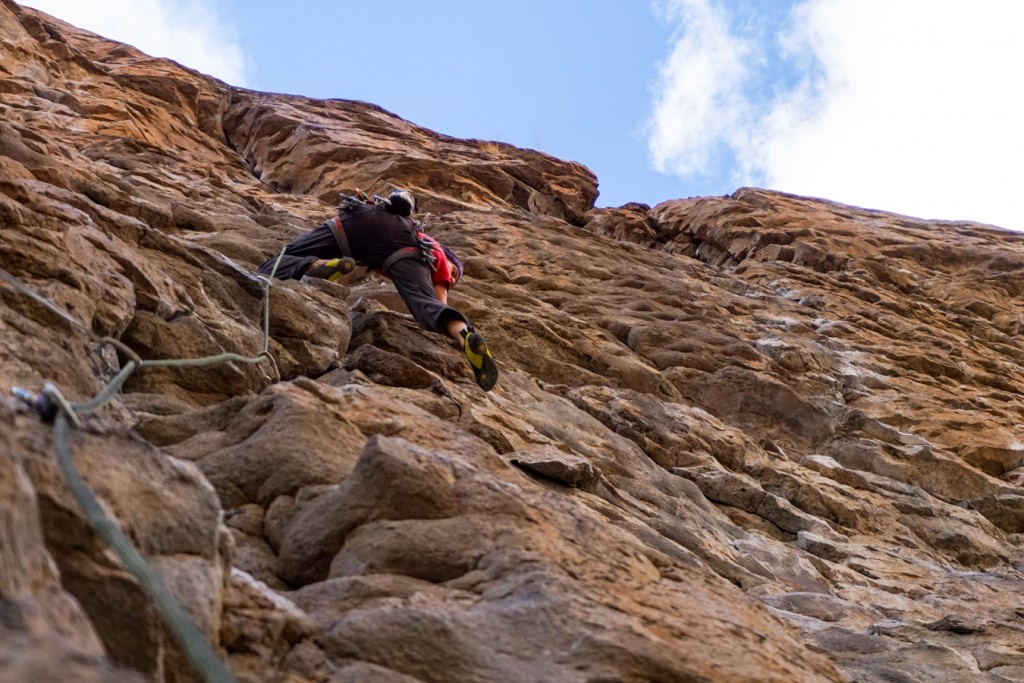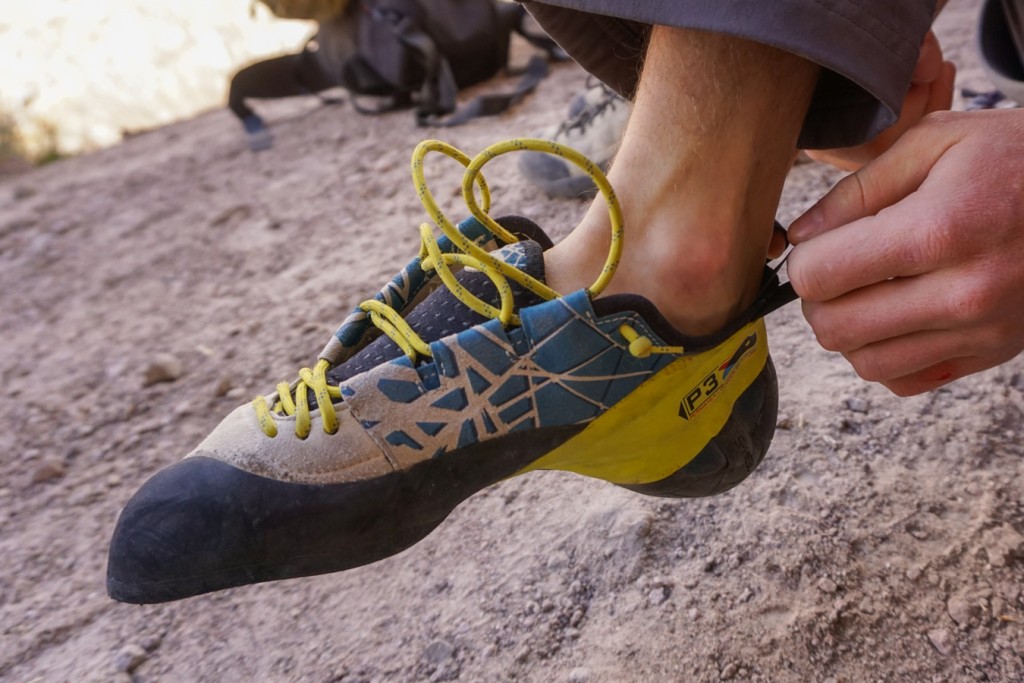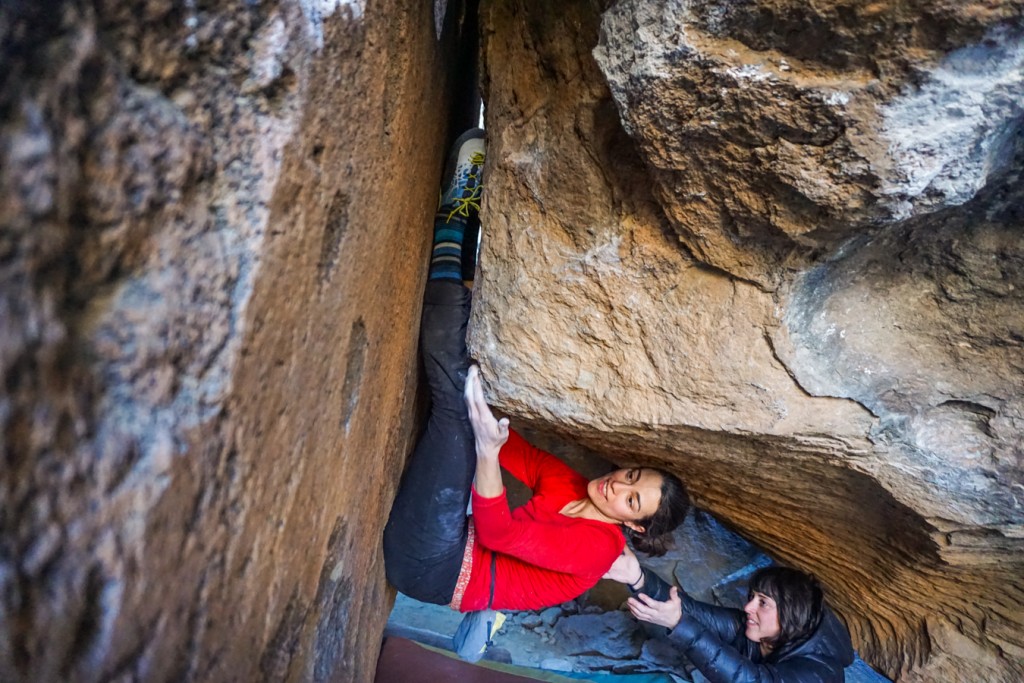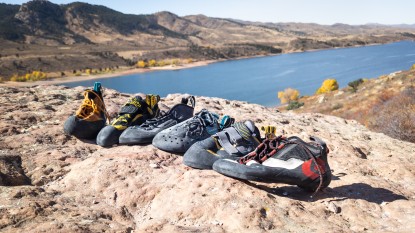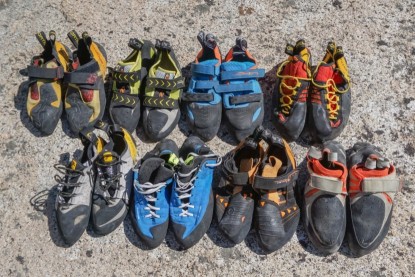La Sportiva Kataki Review
Our Verdict
Our Analysis and Test Results
The Kataki offers exceptional performance in all rating metrics, including crack climbing. Its low profile toe allowed us to gain purchase in thinner finger cracks better than many other high-performance models. This prowess in the cracks, combined with its exceptional edging and heel hooking performance makes it a tester favorite for hard granite climbing, even outperforming popular laceless slipper designs.
Performance Comparison
Edging
The P3 platform used on the Kataki and other premium La Sportiva shoes is designed to add power to the sole and maintain a shoe's down-turned shape. It also supports your big toe right at the powerpoint, allowing you to stand strong on tiny edges. Our testers particularly appreciated this stiffness for sustained techy climbs because it greatly reduced their foot fatigue while slowly unlocking intricate sequences.
The high arches push your toes to the front of the shoe and hold them there, so your toes will stay at the front of the shoe where they can edge the best without having to size the shoe super tight.
Crack Climbing
This shoe looks radically downturned in pictures, and La Sportiva says it's designed for steep climbing, but our testers also loved these things in cracks. Like the Katana, they have a low volume toe that fits in thin cracks better than the higher volume “trad” shoes like the La Sportiva TC Pro or Butora Altura. The heel is narrower than the Katana and tighter over the Achilles, so we didn't like them as much for multi-pitch climbs, but as far a cragging goes, the Kataki is a secret weapon for technical granite cracks. If Katanas and TC Pros aren't cutting it, and your project demands crack skills and technical edging, the Kataki may be the answer.
Don't be put off by the agro look of these shoes when your looking for a crack shoe. Remember, Adam Ondra climbed the Dawn wall in Katanas, and Jorg Verhoeven freed the crux pitches of the Nose in a pair of La Sportiva Solutions. We believe a stiffer, more supportive shoe is more comfortable in cracks, plus the precision lacing system prevents the shoe from rolling on your foot and causing blisters on your pinky toes. For demanding crack climbs, it's all about the fit the shape of the shoe. The Kataki fits the bill perfectly, allowing for a comfortable fit for cranking in cracks without sacrificing edging abilities.
Pockets
The Katakis have a slightly pointier toe box than the Katanas and they're a little more downturned. Both these differences make them better for toeing into steep pockets. Although the Katakis are not as sensitive as the Tenaya Tarifa or the La Sportiva Genius, these shoes are still going to help you blindly stab into pockets when things get desperate.
Combined with their excellent edging prowess, these shoes are a decent choice for pocketed limestone climbing areas such as Wild Iris or Ten Sleep. However, an even better choice would be the pointy-toed Butora Acro, winner of our Best Buy Award, or the La Sportiva Solution. These models are both shaped with a stronger hook in the toe that enhances your ability to pull with your feet better than the Katakis.
Sensitivity
After climbing in the Katakis for 20 or so pitches, they soften up and become more sensitive to tiny ripples and dimples found in technical granite climbing, but thanks to the P3 platform, they don't lose their support or their downturned shape. They come stock with 4mm of Vibram XS Edge rubber. That's a little more than average, allowing the Kataki to provide decent sensitivity without sacrificing durability.
These shoes are not as sensitive as the La Sportiva Genius with its “no-edge” toe, but are on par with the soft Tenaya Tarifa. If you don't like the feel of the no-edge shoe like the Genius or the Futura, this shoe is your best bet for technical edging, as they are a little more aggressive than the Katanas.
Comfort
As we mentioned earlier, the Katakis have a tighter, more aggressive fit than the Katanas, and we don't think they're comfortable enough for long multi-pitch climbs. The high arch is particularly uncomfortable before the shoes are broken in, and the heel can feel tight if you have a wide Achilles. If you're cragging or bouldering with plenty of opportunities to take these shoes off, comfort is less of an issue. However, unless you have a narrow foot, the Kataki probably won't be a good choice for all-day multi-pitch adventures.
The S-heel (S stands for stability) is a reinforced rib of rubber that runs down both sides of the heel and help the heel cup hold its shape when heel hooking. We didn't notice a huge difference between the heel hooking performance of the Kataki and a non s-heel shoe like the Genius, but we can say that the heel on the Kataki stays put nicely during hamstring-straining heel hooks. The lacing system is excellent, allowing you to dial in the fit quickly, and the padded sock-like tongue keeps the tops of your foot free of any pressure points. We'd often warm up on easier routes with the Katakis unlaced, then would crank down the laces when things got steep and technical.
Value
The price is the typical fare for high-performance shoe these days. The Kataki is a decent value because of their durable leather uppers, and the fact that La Sportiva designed them with a ¾ sole to make resoling them easier.
Conclusion
These shoes can turn a good crack climber into a crack ninja thanks to their low profile toe and edging abilities. They even beat out classic crack favorites like the Five Ten Moccasym. While laceless slipper designs do feel comfy in cracks, they can't match the performance of the Kataki on small edges. That's why the Kataki is our favorite shoe for taking down modern test pieces.


